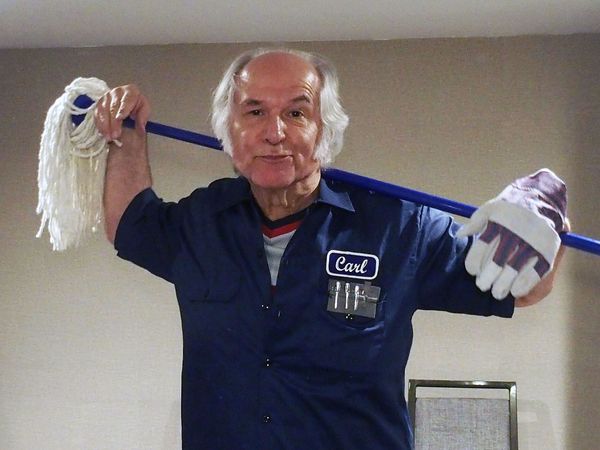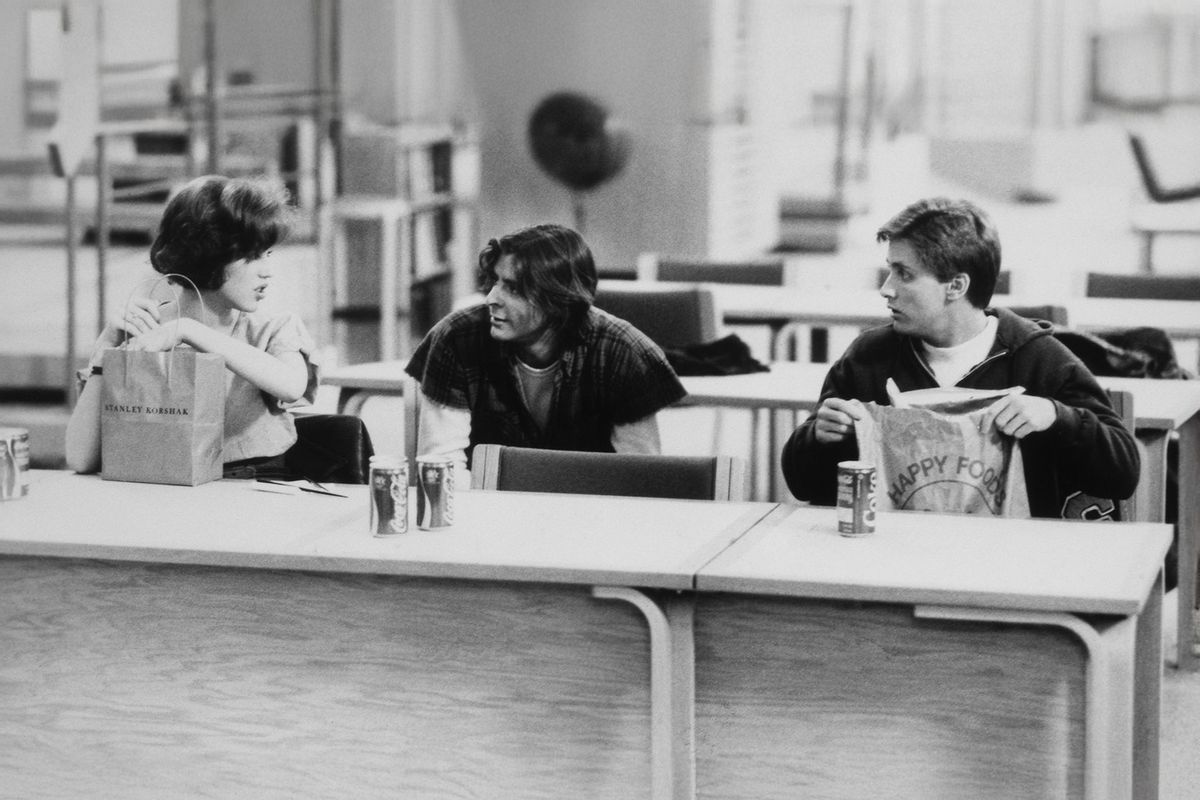John Hughes' teen coming-of-age dramedy, "The Breakfast Club," came out in 1985, which was 40 whole years ago. Hard to believe.
Featuring several key members of Hollywood’s Brat Pack: Emilio Estevez, Anthony Michael Hall, Judd Nelson, Molly Ringwald and Ally Sheedy, the film tells the story of five teenagers from different high school cliques who serve a Saturday detention overseen by two adults: Paul Gleason as Vice Principal Vernon and John Kapelos as Carl the janitor, who was twenty-eight when the movie was made.
While Principal Vernon embodies the bitterness and disillusionment of adulthood, Carl presents an alternative: a man who understands the system but doesn’t let it define him.
Hughes wrote the script in 1982 and filmed it in the spring of 1984. The whole movie was shot at Maine North High School in Des Plaines, Illinois. I remember watching this film for the first time in 9th grade health class and thinking, "Hey, that's my neighborhood." I grew up in Des Plaines (woooo, Maine East Class of ’99) and Hughes grew up in the neighboring suburb of Northbrook. Whenever people watch this movie, they immediately begin to self-reflect on which character best represents their own life story. Is it nerdy Brian, jock Andrew, weirdo Allison, popular Claire, or hooligan Bender? Certainly, none of us relate to authoritarian Vernon, who assigned them each a thousand-word essay on “Who do you think you are?” In response to this big philosophical ask, the pressing question for me has always been: What about Carl Reed?
In the opening moments of the film, the camera pans quickly across a photo plaque of Carl from 1969—he was awarded Man of the Year when he attended that very same high school, and now, he is “following a broom around after s**theads like you,” he remarks to the kids he spends his workdays curiously spying on.
Carl’s role in the story is so often overlooked that even the film’s Wikipedia page affords him only one mention in the plot summary: “Meanwhile, Vernon complains to the janitor, Carl, that students have become less disciplined and more arrogant compared to the ones he had when he was a teacher, but Carl suggests that Vernon is the one who has changed and cares too much about what the students think of him.” Carl’s perceived value is usually limited to the pearls of wisdom he drops in this one conversation with the other adult in the movie. But what about the luxurious intimacy of Carl’s uninterrupted time spent alone, or the moments he spends with the kids? The role calls for a straight-up sage, albeit a somewhat comedic one. A telling detail from the casting proves it. This role originally belonged to Rick Moranis, but when producers saw the travesty of a cartoonish Russian character he’d created for the part, he was replaced with Kapelos.
 John Kapelos attends the Chiller Theatre Autograph Expo Spring 2024 at Parsippany Hilton on April 28, 2024 in Parsippany, New Jersey. (Bobby Bank/Getty Images)The other reason why we should take Carl more seriously is that they gave him a song. Eight of the ten songs on the movie soundtrack credit Keith Forsey as the writer, with five co-credits to composer Steve Schiff. Forsey, more widely known as Giorgio Moroder's drummer, won an Academy Award for "Flashdance...What a Feeling," and had done other hits for "Ghostbusters," "Beverly Hills Cop," and "The NeverEnding Story." The song Forsey and Schiff co-wrote for Carl to listen to is "Waiting," sung by Elizabeth Daily—perhaps better known to Gen Xers as the voice of Tommy Pickles on "Rugrats" and Buttercup on "The Powerpuff Girls." Forsey himself played synthesizer and keyboards on the song, in addition to serving as its producer, mixer, and drum programmer.
John Kapelos attends the Chiller Theatre Autograph Expo Spring 2024 at Parsippany Hilton on April 28, 2024 in Parsippany, New Jersey. (Bobby Bank/Getty Images)The other reason why we should take Carl more seriously is that they gave him a song. Eight of the ten songs on the movie soundtrack credit Keith Forsey as the writer, with five co-credits to composer Steve Schiff. Forsey, more widely known as Giorgio Moroder's drummer, won an Academy Award for "Flashdance...What a Feeling," and had done other hits for "Ghostbusters," "Beverly Hills Cop," and "The NeverEnding Story." The song Forsey and Schiff co-wrote for Carl to listen to is "Waiting," sung by Elizabeth Daily—perhaps better known to Gen Xers as the voice of Tommy Pickles on "Rugrats" and Buttercup on "The Powerpuff Girls." Forsey himself played synthesizer and keyboards on the song, in addition to serving as its producer, mixer, and drum programmer.
Want a daily wrap-up of all the news and commentary Salon has to offer? Subscribe to our morning newsletter, Crash Course.
The scene where “Waiting” is emanating quietly from Carl’s headphones offers a more nuanced take on maturity. While Principal Vernon embodies the bitterness and disillusionment of adulthood, Carl presents an alternative: a man who understands the system but doesn’t let it define him. For Carl, “Waiting” encapsulates a different kind of perspective on life than that of Principal Vernon. Vernon is the archetype of the jaded adult, one who has lost faith in both himself and future generations. His conversation with Carl reveals deep-seated resentment when he laments that the students will be running the country someday and predicts they will be just as self-serving as their parents. For him, time is a conveyor belt leading to inevitable disappointment, a viewpoint shaped by his own failures and growing irrelevance. In his world, waiting is futile because he’s already resigned himself to the belief that nothing gets better. The lyric, “Sitting on ice while the clock is watching, losing face,” describes Vernon’s passivity and despair.
Carl sees the world through a more pragmatic but still hopeful lens.
By contrast, Carl sees the world through a more pragmatic but still hopeful lens. He has no problem leveraging the corruption and flaws in the system when he takes fifty bucks off Vernon in exchange for not reporting the fact that Vernon was looking through confidential school records. But he also recognizes the potential for positive change. When Bender mocks him early in the film, Carl warns Bender not to view him as an “untouchable peasant” and delivers his iconic line, “I am the eyes and ears of this institution, my friends.” This suggests that he observes everything, not just the failings but also the possibilities. Carl comes in peace; the teenagers are actually his compatriots more so than Vernon. Unlike Vernon, he doesn’t assume that the students are doomed to become the worst versions of their parents. His presence in the film argues that adulthood isn’t just about authority and disappointment. It’s also about perspective. The song reinforces this idea with the line “Dreaming of a better space in time,” holding out the possibility of something better, not just endless Saturday detentions.
“Waiting” is a song about longing and persistence, themes that resonate deeply with the core struggles of the film’s teenage protagonists. The lyric, “Drifting through eternal systems / Language spoken, no one listens,” echoes the students’ frustration with being unheard and misunderstood by the adults in their lives. The students worry about the expectations imposed on them and are afraid of being trapped in roles that don’t fit. The song’s refrain, “Waiting, someone better have an answer for me,” underscores the tension between feeling stuck and wanting more, mirroring their collective journey over the course of detention.
Carl tells Vernon, “When I was a kid, I wanted to be John Lennon,” and as it turns out, the janitor is a surprisingly insightful presence, cutting through the posturing of adults and students alike. “Waiting” playing in his headphones isn’t just a throwaway filler detail but instead reveals his role as sort of a guardian angel. By the end, even Bender musters a smile when he exits the building, telling Carl, “See you next Saturday,” to which Carl enthusiastically replies, “You bet.” His part is subtle but it's a powerful reminder that adulthood doesn’t have to mean giving up. It can mean watching, listening, and understanding that things can always change, even if it takes time. As the song puts it, “Waiting is the price of freedom.”
Read more
about "The Breakfast Club"
- First draft of "The Breakfast Club" screenplay found tucked away in Shermer High file cabinet
- "Single Drunk Female" star Ally Sheedy: "My most multidimensional roles come from women"
- When you grow up, your heart doesn't have to die: Kevin Smokler and Jason Diamond on the perfectly imperfect world of John Hughes



Shares